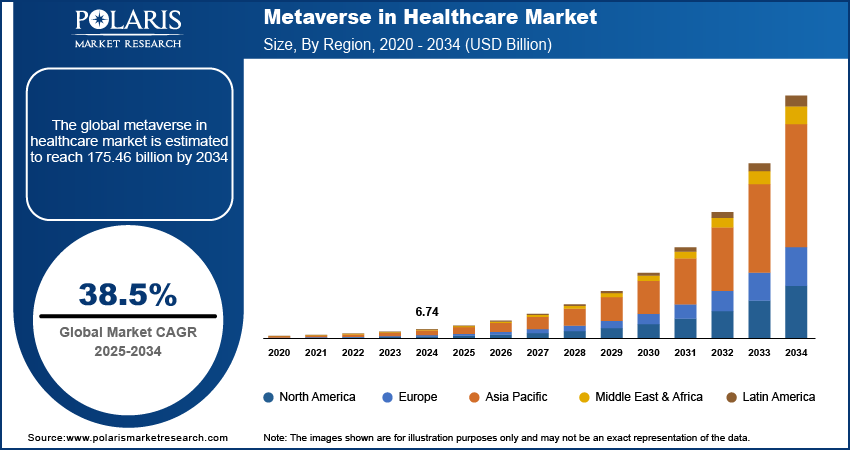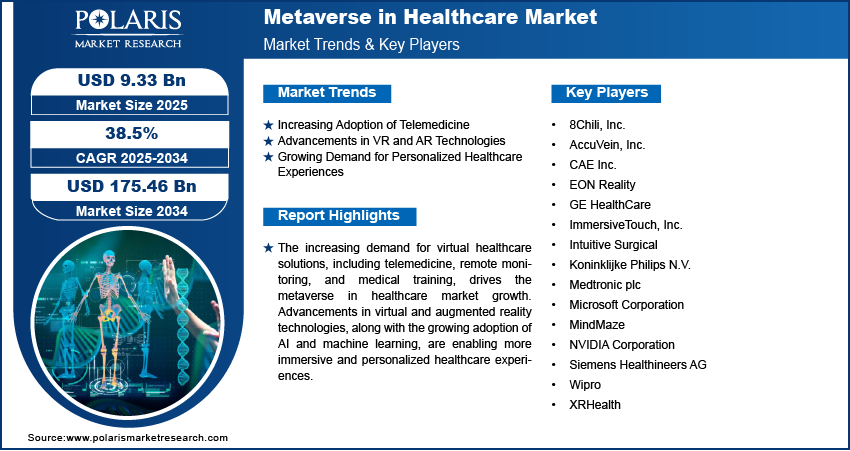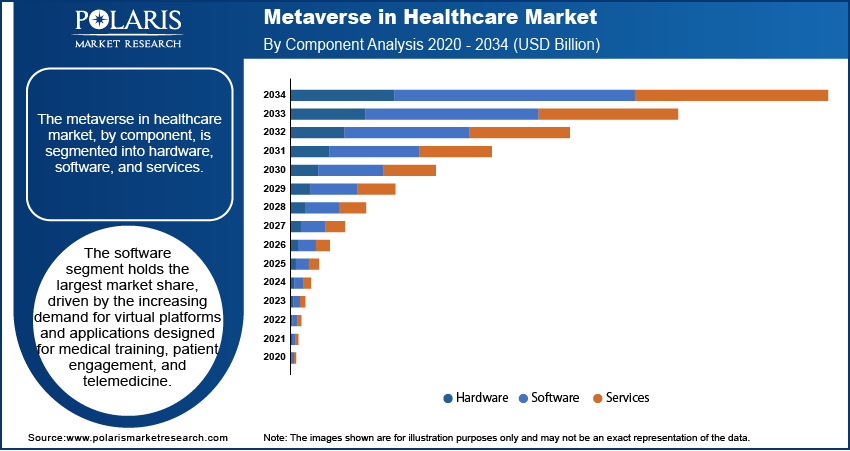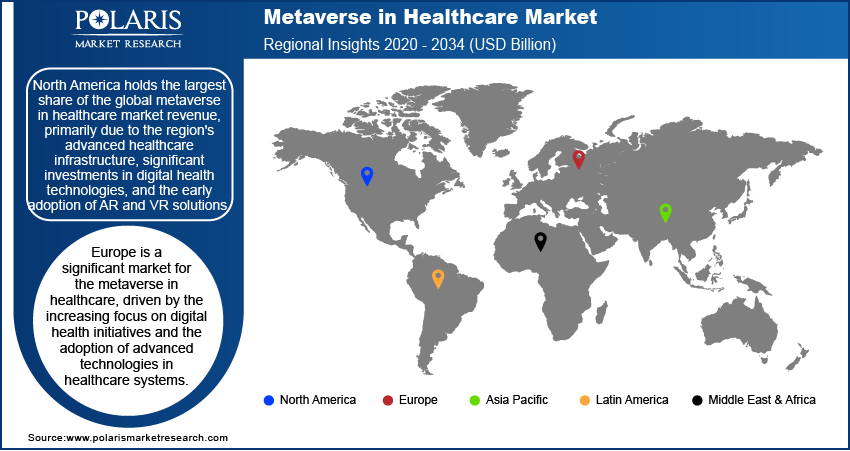
Metaverse in Healthcare Market Size, Share, Trends, Industry Analysis Report
: By Component (Hardware, Software, and Services), Application, Technology, End Use, and Region (North America, Europe, Asia Pacific, Latin America, and Middle East & Africa) – Market Forecast, 2025–2034
- Published Date:Apr-2025
- Pages: 118
- Format: PDF
- Report ID: PM3878
- Base Year: 2024
- Historical Data: 2020-2023
Metaverse in Healthcare Market Overview
The metaverse in healthcare market size was valued at USD 6.74 billion in 2024. The market is projected to grow from USD 9.33 billion in 2025 to USD 175.46 billion by 2034, exhibiting a CAGR of 38.5% during 2025–2034.
The metaverse in healthcare market refers to the integration of virtual and augmented reality technologies to create immersive digital environments for healthcare applications. This market encompasses various uses, including virtual consultations, medical training, therapy, and patient engagement. Key drivers include the increasing adoption of telemedicine, advancements in VR and AR technologies, and the growing demand for personalized healthcare experiences. Metaverse in healthcare market trends involve the use of AI-driven virtual assistants, the development of virtual healthcare facilities, and the incorporation of blockchain for secure data management. The market is poised for significant growth as healthcare providers and patients seek innovative, technology-driven solutions for improving care delivery and outcomes.

To Understand More About this Research: Request a Free Sample Report
Metaverse in Healthcare Market Dynamics
Increasing Adoption of Telemedicine
Telemedicine enables remote consultations, diagnostics, and follow-up care, reducing the need for physical visits. According to the American Medical Association, telehealth usage increased by 53% in 2020, highlighting its growing acceptance among patients and providers. The metaverse expands this capability by providing virtual environments where patients can engage with healthcare professionals in a more interactive manner, enhancing the telemedicine experience through immersive consultations and virtual examination rooms. Therefore, the rising adoption of telemedicine contributes to the metaverse in healthcare market development.
Advancements in VR and AR Technologies
Virtual reality (VR) and augmented reality (AR) technologies are increasingly used for medical training, surgical simulations, and patient rehabilitation. For instance, a study published in the Journal of Medical Internet Research found that VR-based training improved surgical performance by 230% compared to traditional methods. The continuous innovation in VR and AR hardware and software facilitates the creation of realistic virtual environments, enabling more effective and engaging healthcare solutions. Hence, the rapid advancements in VR and AR technologies are another major driver of the metaverse in healthcare market demand.
Growing Demand for Personalized Healthcare Experiences
Personalized healthcare experiences are becoming a priority for patients, driving the adoption of metaverse applications in healthcare. The metaverse allows for tailored patient interactions, where virtual environments can be customized to meet individual needs. A report by Accenture revealed that 80% of consumers are more likely to choose providers offering personalized experiences. The use of AI-driven analytics within the Metaverse further enhances this personalization by providing real-time insights and recommendations, contributing to improved patient satisfaction and outcomes. Thus, the increasing demand for personalized healthcare experiences is expected to boost the metaverse in healthcare market growth in the coming years.

Metaverse in Healthcare Market Segment Insights
Metaverse in Healthcare Market Assessment – Component-Based Insights
Based on component, the metaverse in healthcare market is segmented into hardware, software, and services. The software segment holds the largest market share, driven by the increasing demand for virtual platforms and applications designed for medical training, patient engagement, and telemedicine. Advanced software solutions enable immersive experiences through virtual reality (VR) and augmented reality (AR), which are critical for the development of effective healthcare metaverse applications. The rising adoption of electronic health records (EHR) integration and AI-powered diagnostic tools further boosts the software segment growth.
The services segment is registering the highest growth rate, fueled by the need for continuous support, maintenance, and development of metaverse environments in healthcare. As healthcare providers increasingly adopt metaverse technologies, the demand for consulting, implementation, and managed services rises to ensure seamless integration and optimal performance. The growth in this segment is also attributed to the increasing reliance on third-party service providers for training, customization, and troubleshooting, which are essential for maintaining advanced metaverse platforms in clinical and nonclinical settings.
Metaverse in Healthcare Market Outlook – Application-Based Insights
The metaverse in healthcare market, by application, is segmented into telemedicine, medical training & simulation, remote monitoring, robot-assisted surgery, and others. The telemedicine segment holds the largest share of the metaverse in healthcare market revenue, driven by the increasing demand for virtual consultations and remote healthcare services. Telemedicine applications leverage the metaverse to provide immersive and interactive environments, enhancing patient-provider communication and enabling more comprehensive remote diagnostics. The widespread adoption of telemedicine, especially post-pandemic, has accelerated the integration of advanced technologies such as VR and AR into telehealth platforms, contributing to the dominance of this segment.
The medical training & simulation segment is registering the highest growth rate, supported by the rising need for innovative training solutions for healthcare professionals. Virtual reality-based simulations offer a safe and controlled environment for medical students and practitioners to practice complex procedures, improve surgical skills, and enhance patient safety. The use of metaverse technologies in medical training addresses the growing demand for experiential learning, reducing the dependency on physical resources and enabling more accessible and scalable training solutions across the healthcare industry.
Metaverse in Healthcare Market Evaluation – End Use-Based Insights
The metaverse in healthcare market, based on end use, is segmented into clinical research, medical centers, diagnostic centers, medical device manufacturers, biotech & pharmaceutical companies, and others. The medical centers segment leads the metaverse in healthcare market share, driven by the increasing adoption of virtual and augmented reality technologies for patient engagement, diagnostics, and treatment planning. Medical centers utilize metaverse solutions to enhance patient care through virtual consultations, immersive treatment simulations, and interactive patient education. The integration of these technologies allows for improved patient outcomes and operational efficiency, making it a pivotal segment in the healthcare metaverse ecosystem.
The clinical research segment is registering the highest growth rate, fueled by the need for innovative tools to enhance research accuracy and efficiency. The use of metaverse technologies in clinical trials enables remote monitoring, virtual patient recruitment, and real-time data analysis, significantly accelerating the research process. This growth is supported by the increasing adoption of decentralized clinical trials and the demand for scalable, technology-driven solutions to conduct complex research activities more effectively and cost-efficiently.

Metaverse in Healthcare Market Regional Insights
By region, the study provides metaverse in healthcare market insights into North America, Europe, Asia Pacific, Latin America, and the Middle East & Africa. North America holds the largest share of the global metaverse in healthcare market revenue, primarily due to the region's advanced healthcare infrastructure, significant investments in digital health technologies, and the early adoption of virtual and augmented reality solutions. The presence of major technology companies and healthcare providers in the US and Canada has accelerated the development and deployment of metaverse applications. Additionally, favorable government initiatives supporting telemedicine and digital health innovations drive market growth in this region. Other regions, such as Europe and Asia Pacific, are also witnessing increasing adoption, but North America's strong technological base and proactive approach to integrating innovative healthcare solutions position it as the dominant market.
Europe is a significant market for the metaverse in healthcare, driven by the increasing focus on digital health initiatives and the adoption of advanced technologies in healthcare systems. Countries such as Germany, the UK, and France are leading the adoption of metaverse applications, supported by government policies promoting telemedicine and eHealth solutions. The region's strong emphasis on research and development in medical technology, coupled with a well-established healthcare infrastructure, contributes to the steady growth of the market.
The Asia Pacific metaverse in healthcare market is experiencing rapid growth, fueled by rising investments in healthcare digitization and the growing demand for innovative medical solutions. Countries such as China, Japan, and India are at the forefront, leveraging VR and AR technologies for medical training, remote diagnostics, and patient engagement. The increasing penetration of smartphones and internet connectivity, along with supportive government policies in healthcare technology adoption, is driving the metaverse in healthcare market expansion in this region.

Metaverse in Healthcare Market – Key Players and Competitive Insights
In the metaverse in healthcare market, several companies are actively contributing to the development and implementation of virtual and augmented reality solutions. A few notable participants include Microsoft Corporation; NVIDIA Corporation; XRHealth; CAE Inc.; Koninklijke Philips N.V.; ImmersiveTouch, Inc.; Wipro; Siemens Healthineers AG; Medtronic plc; GE HealthCare; Intuitive Surgical; 8Chili, Inc.; MindMaze; AccuVein, Inc.; and EON Reality.
These companies offer a range of products and services that enhance medical training, patient care, and healthcare operations. For instance, Microsoft's HoloLens provides AR experiences for medical professionals, while NVIDIA's Omniverse platform facilitates collaborative 3D simulation environments. XRHealth specializes in VR therapy applications, and Siemens Healthineers integrates AR/VR technologies into diagnostic and therapeutic equipment. Medtronic focuses on developing immersive solutions for surgical procedures, and GE HealthCare collaborates on medical imaging systems within the metaverse.
The competitive landscape is characterized by strategic partnerships, product innovations, and investments in research and development. Companies are increasingly collaborating to integrate metaverse technologies into healthcare settings, aiming to improve patient outcomes and operational efficiency. The emphasis on creating user-friendly, secure, and effective virtual environments is driving competition, with each company striving to offer unique solutions tailored to the evolving needs of the healthcare industry.
Microsoft Corporation is a key player in the metaverse in healthcare market, offering the HoloLens 2 mixed reality headset. This device enables healthcare professionals to access patient data, visualize medical images in 3D, and collaborate remotely, thereby enhancing patient care and operational efficiency.
NVIDIA Corporation contributes to the metaverse in healthcare market revenue share through its Omniverse platform, which allows for the creation of virtual environments and simulations. Healthcare professionals use this platform for medical training, surgical simulations, and collaborative research, benefiting from NVIDIA's expertise in graphics processing and AI technologies.
List of Key Companies in Metaverse in Healthcare Market
- 8Chili, Inc.
- AccuVein, Inc.
- CAE Inc.
- EON Reality
- GE HealthCare
- ImmersiveTouch, Inc.
- Intuitive Surgical
- Koninklijke Philips N.V.
- Medtronic plc
- Microsoft Corporation
- MindMaze
- NVIDIA Corporation
- Siemens Healthineers AG
- Wipro
- XRHealth
Metaverse in Healthcare Industry Developments
- In April 2022, HCG Cancer Hospital in Bengaluru, India, launched the country's first Extended Reality Lab using Microsoft HoloLens 2 to improve patient experiences and facilitate remote collaboration between specialists and surgeons in different locations.
- In March 2022, NVIDIA announced the expansion of Omniverse with new features aimed at enhancing virtual collaboration and simulation capabilities, further supporting its applications in healthcare.
Metaverse in Healthcare Market Segmentation
By Component Outlook (Revenue – USD Billion, 2020–2034)
- Hardware
- Software
- Services
By Application Outlook (Revenue – USD Billion, 2020–2034)
- Telemedicine
- Medical Training & Simulation
- Remote Monitoring
- Robot-Assisted Surgery
- Others
By Technology Outlook (Revenue – USD Billion, 2020–2034)
- IoT
- Blockchain
- Augmented/Virtual Reality
- Artificial Intelligence
- Others
By End Use Outlook (Revenue – USD Billion, 2020–2034)
- Clinical Research
- Medical Centers
- Diagnostic Centers
- Medical Device Manufacturers
- Biotech & Pharmaceutical Companies
- Others
By Regional Outlook (Revenue – USD Billion, 2020–2034)
- North America
- US
- Canada
- Europe
- Germany
- France
- UK
- Italy
- Spain
- Netherlands
- Russia
- Rest of Europe
- Asia Pacific
- China
- Japan
- India
- Malaysia
- South Korea
- Indonesia
- Australia
- Vietnam
- Rest of Asia Pacific
- Middle East & Africa
- Saudi Arabia
- UAE
- Israel
- South Africa
- Rest of Middle East & Africa
- Latin America
- Mexico
- Brazil
- Argentina
- Rest of Latin America
Metaverse in Healthcare Market Report Scope
|
Report Attributes |
Details |
|
Market Size Value in 2024 |
USD 6.74 billion |
|
Market Size Value in 2025 |
USD 9.33 billion |
|
Revenue Forecast by 2034 |
USD 175.46 billion |
|
CAGR |
38.5% from 2025 to 2034 |
|
Base Year |
2024 |
|
Historical Data |
2020–2023 |
|
Forecast Period |
2025–2034 |
|
Quantitative Units |
Revenue in USD billion and CAGR from 2025 to 2034 |
|
Report Coverage |
Revenue Forecast, Market Competitive Landscape, Growth Factors, and Trends |
|
Segments Covered |
|
|
Regional Scope |
|
|
Competitive Landscape |
|
|
Report Format |
|
|
Customization |
Report customization as per your requirements with respect to countries, regions, and segmentation. |
How is the report valuable for an organization?
Workflow/Innovation Strategy: The metaverse in healthcare market has been broadly segmented on the basis of component, application, technology, and end use. Moreover, the study provides the reader with a detailed understanding of the different segments at both the global and regional levels.
Growth/Marketing Strategy: The metaverse in healthcare market growth strategy focuses on continuous innovation, partnerships, and expanding the range of virtual and augmented reality applications. Companies are investing in research and development to enhance the capabilities of their platforms, aiming to improve medical training, patient care, and operational efficiency. Collaborations with healthcare providers, technology firms, and research institutions are driving the adoption of metaverse technologies across various healthcare segments. Additionally, marketing efforts are centered around educating healthcare professionals and organizations about the benefits of integrating virtual environments into their practices, with an emphasis on improving patient outcomes and reducing costs.
FAQ's
The metaverse in healthcare market size was valued at USD 6.74 billion in 2024 and is projected to grow to USD 175.46 billion by 2034.
The market is projected to register a CAGR of 38.5% during the forecast period.
North America held the largest share of the market in 2024.
A few notable key market players include Microsoft Corporation; NVIDIA Corporation; XRHealth; CAE Inc.; Koninklijke Philips N.V.; ImmersiveTouch, Inc.; Wipro; Siemens Healthineers AG; Medtronic plc; GE HealthCare; Intuitive Surgical; 8Chili, Inc.; MindMaze; AccuVein, Inc.; and EON Reality.
The software segment accounted for the largest share of the market in 2024.
Metaverse in healthcare refers to the use of virtual and augmented reality (VR and AR) technologies to create immersive digital environments that enhance various aspects of the healthcare industry. These environments enable virtual consultations, medical training, remote monitoring, surgery simulations, and patient engagement. The metaverse allows healthcare professionals to interact with patients and collaborate remotely, providing advanced tools for diagnostics, treatment planning, and education. By integrating these technologies, the metaverse aims to improve patient outcomes, reduce operational costs, and make healthcare services more accessible and efficient.
A few key trends in the market are described below: Integration of AI and Machine Learning: AI is being used to power virtual assistants, enhance diagnostics, and offer personalized treatment recommendations within the metaverse. Telemedicine Expansion: Increased adoption of virtual consultations and remote care, driven by the need for accessible healthcare. Growth of Virtual Medical Training: Use of VR and AR for immersive medical simulations, improving training for healthcare professionals without the need for physical resources. Patient-Centric Virtual Environments: Focus on creating more engaging and interactive platforms for patients, improving care experiences and outcomes.
A new company entering the metaverse in healthcare market must focus on developing specialized applications that enhance patient engagement and personalized care, such as virtual rehabilitation and AI-powered health monitoring tools. Emphasizing secure, decentralized platforms for clinical trials and telemedicine services would be another strategic area, aligning with the growing demand for remote care. Collaborating with healthcare providers and educational institutions for immersive medical training and simulation solutions could also offer a competitive edge. Additionally, investing in the integration of blockchain for secure data management and ensuring compliance with healthcare regulations would be key to building trust in a highly regulated industry.
